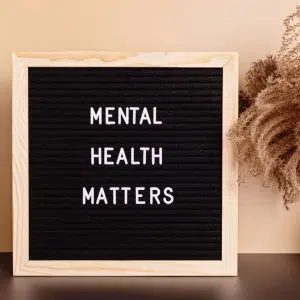In 18 years of practice, I’ve had my fair share of conversations supporting a patient in figuring out what to do next. When it comes to health, the journey forward is not black and white. There are many things to consider when you’re thinking about possible treatments whether they be medication, surgery, or alternative routes. What I’ve found over the years is that folks aren’t always thinking as clearly as they may like to in these situations.
Oftenttimes, beneath the surface of rational thought lies a complex web of cognitive processes that can subtly influence our choices. These processes, often referred to as cognitive distortions, can significantly impact the quality and effectiveness of medical decisions.
What are Cognitive Distortions?
Cognitive distortions are patterns of thinking that are irrational, biased, or inaccurate. They can shape how we perceive information, interpret situations, and make judgments. These distortions are not deliberate; rather, they are automatic and often rooted in deep-seated beliefs or past experiences.
Examples of Cognitive Distortions in Medical Contexts
- Catastrophizing: This involves magnifying the importance or implications of a health issue or medical procedure. For instance, someone might overly focus on the potential risks of a treatment without adequately considering its benefits. This is very common as no one wants to be in these positions in the first place. We have a lot of fear and resistance that comes up with health challenges.
- Overgeneralization: Drawing broad conclusions based on limited evidence. For instance, assuming that because one treatment did not work well for a friend, it will also fail for oneself. I often hear this when people do an excessive amount of internet polling. Of course it’s good to do research but you can’t take other people’s journeys on as your own.
- Confirmation Bias: Seeking out information that confirms preexisting beliefs while ignoring contradictory evidence. This can lead individuals to favor sources that support their views rather than considering a balanced perspective. This is very important in the day and age we are in where often times our medical information comes from patients rather than experts.
- Emotional Reasoning: Making decisions based on emotions rather than objective facts. For example, someone might refuse a necessary surgery out of fear, despite medical evidence indicating its benefits & safety. I see this in practice mostly when people want to leave surgery as a “last result” when there are some occasions where the surgery is the only true way to fix the situation and waiting longer will only make the surgery more difficult to perform and recover from.
- Labeling: Applying overly simplistic labels to oneself or others based on health conditions. This can lead to stigma or self-fulfilling prophecies regarding health outcomes. This is a quite common reaction to going on medication. I’ve seen “health influencers” making statements such as “all medication is poison” while this is simply not true. There are plenty of folks taking medication for whom it is wholly life affirming – meaning they are able to be the best versions of who they are – and have little to no negative side effects. It is just a very nuanced conversation and to say all medication is poison is a part of why people feel the stigma and don’t take medications that they very may well need.
Impact on Medical Decision-Making
- Treatment Compliance: Patients may fail to adhere to prescribed treatments or therapies due to exaggerated fears or misconceptions.
- Decision Paralysis: Overwhelmed by negative thinking or catastrophic predictions, individuals may struggle to make decisions, delaying necessary medical interventions. Having a helpful medical team is the best way to navigate this situation. Friends and family are generally not educated enough on these topics to be weighing in.
- Misinterpretation of Information: Patients may misunderstand medical information or selectively focus on details that confirm their biases, leading to misguided choices.
- Stress and Anxiety: Persistent cognitive distortions can exacerbate stress and anxiety related to health conditions, further impairing judgment and quality of life. This is quite common for people who experience looping thoughts. They often are so anxious that they can’t get the proper treatment that they need, which keeps them stuck in their health challenges rather than moving through them.
Addressing Cognitive Distortions
Recognizing and addressing cognitive distortions is crucial for improving medical decision-making:
- Education and Awareness: The first step begins with having the capacity to realize your anxiety, biases, and lack of education could be playing a role. When we’re the patient, it’s impossible to be objective. This will help you to see where you’re making choices from.
- Cognitive Behavioral Therapy (CBT): CBT techniques can help individuals identify and challenge cognitive distortions, promoting more balanced and rational thinking.
- Shared Decision-Making: Collaborative approaches between patients and healthcare providers can help ensure that decisions are based on comprehensive information and aligned with the patient’s values and preferences.
- Support Networks: Engaging with support groups or counseling services can provide emotional support and alternative perspectives, reducing the impact of cognitive distortions.
I’m grateful to be a part of the process of fostering awareness and reducing biases. It’s hard to be in the patient seat which is why it takes a village of practicioners to support us when we’re going through something.
By fostering awareness, promoting education, and integrating supportive interventions, we can empower individuals to make more informed, rational, and ultimately beneficial medical decisions. Addressing cognitive distortions is not merely about correcting faulty thinking patterns but about enhancing the overall quality of care and outcomes for patients.




Such a thorough explanation of the often complicated process of médica decision making. Thanks for your insight